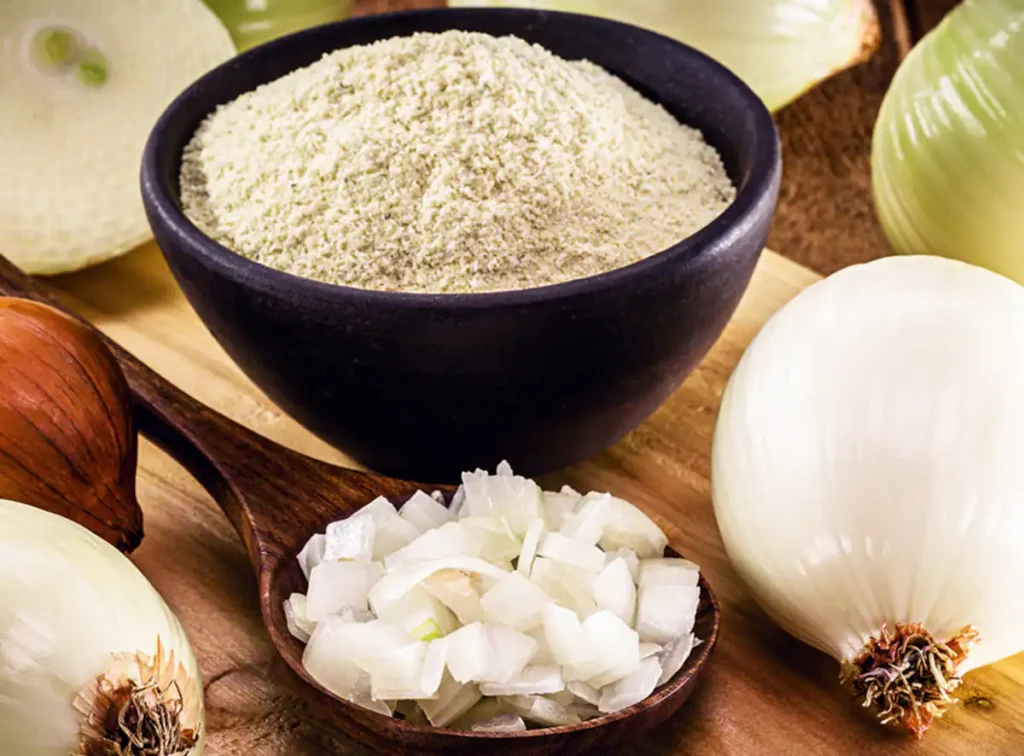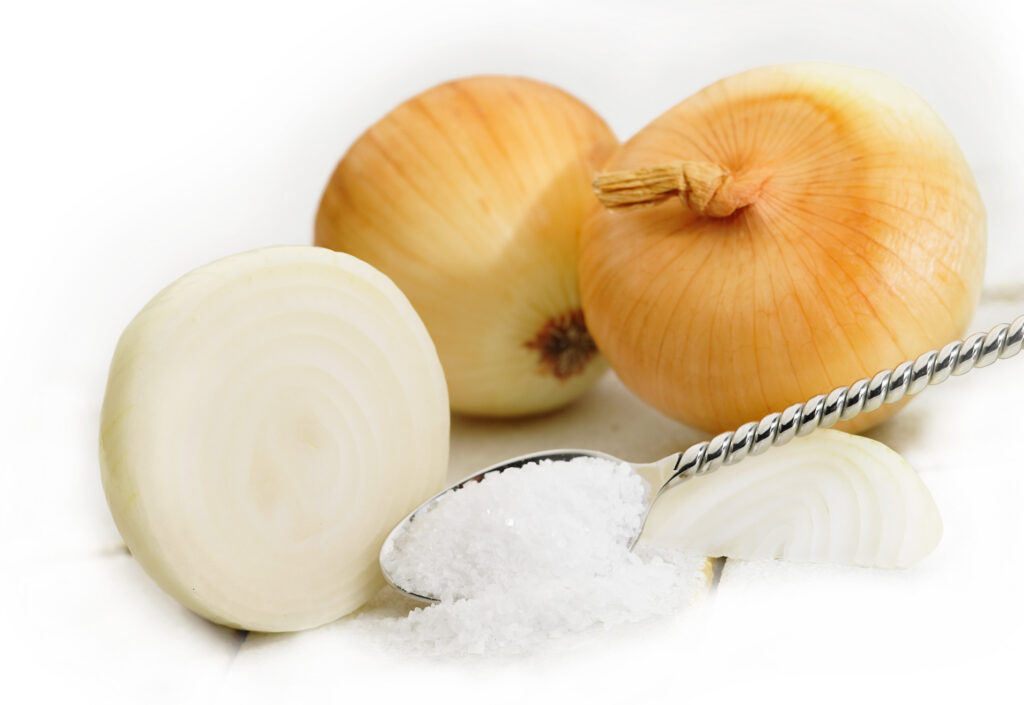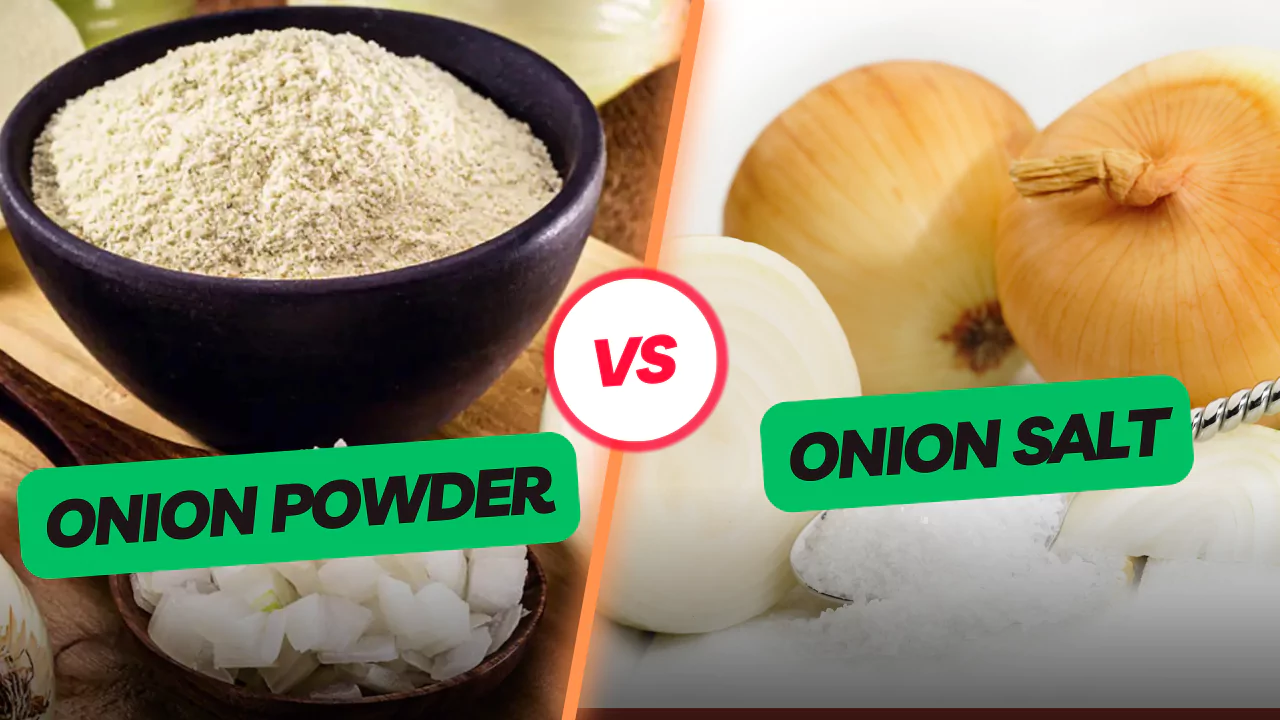Onion Powder vs. Onion Salt – when it comes to enhancing the flavor of dishes, onions are a popular choice in many cuisines worldwide. They add a distinct and savory taste that can elevate the overall taste profile of a dish. However, different forms of onion seasonings are available, such as onion salt and onion powder. While they may seem similar at first glance, the two have some key differences.
This article will explore these differences along with queries like how to make onion salt or onion powder ingredients. So, without further details, let’s go through the main details!
What Is Onion Powder?

Onion powder is a spice made from dehydrated onions ground into a fine powder. It is commonly used as a flavoring agent in various cuisines worldwide. Onion powder provides a concentrated flavor and aroma, making it a convenient alternative to fresh onions in recipes. It is often used in soups, stews, sauces, marinades, dressings, and seasoning blends.
Onion powder is known for its versatility and ability to enhance the taste of dishes without adding bulk or texture. It is also valued for its long shelf life and ease of use. Onion powder can be made by dehydrating onions and grinding them into fine powder. The process involves:
- Removing the moisture from the onions through drying methods such as air drying.
- Sun drying.
- Using a food dehydrator.
Once the onions are completely dried, they are pulverized into a powder using a grinder or blender. The resulting powder can be stored in an airtight container in a cool, dry place for an
extended period.
Explore More Onion Topics
What About Onion Salt?

Onion salt is a seasoning blend of dried onion powder and table salt. It is commonly used in cooking and adds a savory and slightly sweet flavor to dishes. Onion salt can be used as a substitute for fresh onions when unavailable or when a milder onion flavor is desired. It is trendy in soups, stews, dips, dressings, and marinades. However, it is essential to note that onion salt should be used sparingly as it contains high sodium. It is recommended to check the label for sodium content and adjust the usage accordingly to maintain a balanced diet.
Onion Salt Vs. Onion Powder
Onion salt and onion powder are popular seasonings used in cooking to add a savory onion flavor to dishes. While they share a common ingredient, dried onions, there are some differences in texture, taste, and usage.
Texture
One noticeable difference between onion salt and onion powder is their texture. Onion salt has a coarse texture due to salt crystals mixed with the onion powder. In contrast, onion powder has a delicate and powdery texture, making it easier to incorporate into recipes.
Salt Content
As the name suggests, onion salt contains salt as an ingredient, whereas onion powder is made from dried onions without added salt. This salt content difference can affect the dishes’ overall flavor and sodium levels. If you are watching your sodium intake or prefer to control the salt in your recipes, using onion powder instead of onion salt may be a better option.
Usage
The presence of salt in onion salt makes it a suitable choice for seasoning dishes that require both onion flavor and saltiness. It can be used as a standalone seasoning or combined with other spices. Onion powder, however, provides a concentrated onion flavor without the added salt. It is more versatile and can be used in a broader range of recipes where you want to enhance the taste of onions without affecting the overall salt content.
Can I Substitute Onion Powder With Onion Salt And Vice Versa?
Yes, you can substitute onion powder with onion salt and vice versa, but it is essential to consider the differences in flavor and sodium content. Onion powder is made by dehydrating and grinding onions into a fine powder, while onion salt is a mixture of onion powder and salt. When using onion powder as a substitute for onion salt, you may need to adjust the amount of salt in your recipe accordingly.
Similarly, when substituting onion salt for onion powder, you may need to reduce the additional salt added to your dish. Onion salt contains sodium, so if you watch your sodium intake, using onion powder without added salt might be a better option.
Health Benefits Of Onion Powder And Onion Salt
Onion powder and onion salt are popular seasonings widely used in cooking to enhance the flavor of various dishes. While they may be primarily used for their taste, they also offer several health benefits due to the nutritional properties of onions.
Here, we will explore the health benefits of onion powder and salt.
Rich in Antioxidants
Onions, and consequently onion powder and salt, are packed with antioxidants that help protect the body against oxidative stress caused by free radicals. Free radicals can damage cells and contribute to chronic diseases like heart disease, cancer, and diabetes. The antioxidants in onions, including quercetin, anthocyanins, and sulfur compounds, help neutralize these harmful free radicals and reduce the risk of chronic diseases.
Anti-Inflammatory Properties
Onions contain various anti-inflammatory compounds that can help reduce inflammation in the body. Chronic inflammation is associated with several health conditions, including arthritis, cardiovascular disease, and certain types of cancer. The sulfur compounds found in onions have been shown to possess anti-inflammatory effects by inhibiting the production of inflammatory substances in the body. Including onion powder or salt in your diet may help alleviate inflammation and promote overall health.
Heart Health
Due to their potential cholesterol-lowering effects, onion powder and salt can contribute to heart health. Onions contain a compound called allicin, which has been shown to help lower LDL (bad) cholesterol levels while increasing HDL (good) cholesterol levels. By reducing LDL cholesterol, onion powder and onion salt may help prevent plaque buildup in the arteries, reducing the risk of heart disease and stroke.
Digestive Health
Onions are a good source of dietary fiber essential for maintaining a healthy digestive system. Fiber helps regulate bowel movements, prevents constipation, and promotes a healthy gut microbiome. Including onion powder or onion salt in your diet can provide a convenient way to increase fiber intake and support digestive health.
Immune System Support
Onions are known for their immune-boosting properties. They are rich in vitamin C, an essential nutrient for a robust immune system. Vitamin C stimulates the production of white blood cells, which fight infections and diseases. Including onion powder or salt in your meals can help support your immune system and protect against common illnesses.
Do Your Onion Salt And Onion Powder Go Bad?
Onion salt and powder can go bad over time, but their shelf life is generally long if stored properly. Both onion salt and onion powder are made by dehydrating onions, which helps to preserve their flavor and extend their shelf life.
However, over time, the flavor and potency of these products may diminish. Factors such as exposure to moisture, heat, and light can accelerate the degradation process. It is essential to store onion salt and onion powder in airtight containers in a cool, dry place away from direct sunlight. Proper storage can help maintain the quality of onion salt and onion powder for an extended period. It is recommended to check the expiration date on the packaging and discard them if they have passed that date or developed an off smell or taste.
How Can We Preserve Onions?
Onions are a versatile and widely used vegetable in various cuisines worldwide. They add flavor, aroma, and texture to various dishes. To ensure their availability and freshness for an extended period, it is essential to preserve onions properly.
Several methods can be employed to preserve onions, each with advantages and considerations.
- Store onions in a cool, dry, and well-ventilated place
- Avoid storing onions near potatoes or other fruits and vegetables that release moisture
- Remove any dirt or debris from the onions before storing
- Do not wash onions before storing
- Store onions in a mesh bag or a container with good airflow
- Check onions regularly for signs of spoilage or sprouting
- Use the oldest onions first to prevent waste
- Consider preserving onions by freezing, dehydrating, or pickling them
Conclusion
In conclusion, the difference between onion salt and onion powder lies in their composition and usage. Onion salt combines finely ground onion powder and salt, providing a convenient way to add flavors and seasoning to dishes. It is commonly used as a meat, soup, and stew seasoning. Onion powder, conversely, is solely made from dehydrated onions that have been ground into a fine powder. It offers a more concentrated onion flavor without the added salt. Onion powder is versatile and can be used in various recipes such as dips, dressings, and marinades. Ultimately, the choice between onion salt and powder depends on personal preference and dietary needs.
FAQs
Can You Use Onion Salt Instead Of Onion Powder?
Yes, you can use onion salt instead of onion powder, but remember that onion salt contains additional ingredients like salt, so adjust the amount accordingly to avoid oversalting your dish.
How Much Onion Powder For Onion Salt?
The ratio for substituting onion powder for onion salt is 1:3, meaning you should use three times as much onion powder as the amount of onion salt required.
What Can I Substitute For Onion Powder?
Some possible substitutes for onion powder include minced fresh onions, granulated onion, or garlic powder. However, the flavor profile may vary slightly depending on the substitute used.
Can You Use Onion Salt Instead Of Garlic Powder?
Yes, you can use onion salt as a substitute for garlic powder, but remember that it will add a different flavor profile to your dish. It is recommended to adjust the quantity according to taste.
Does Onion Powder Have Salt In It?
Yes, onion powder does not naturally contain salt, but some commercially available brands may add salt as an ingredient.
Meta Description
Onion Salt vs. Onion Powder – What is the Difference? This comprehensive article explores the distinctions between these two popular seasonings.






